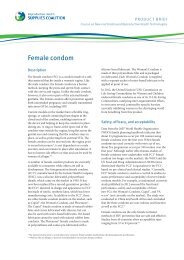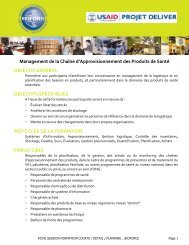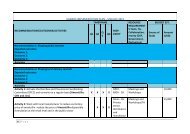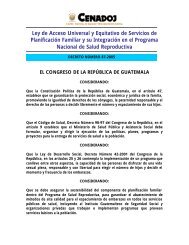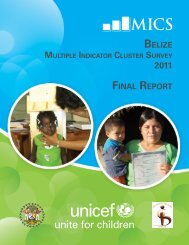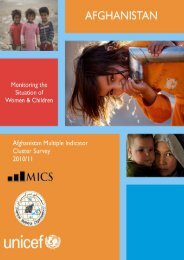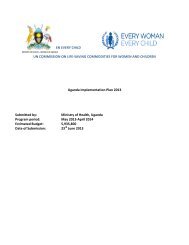Frequently Asked Questions on the Prequalification of Medicines for ...
Frequently Asked Questions on the Prequalification of Medicines for ...
Frequently Asked Questions on the Prequalification of Medicines for ...
You also want an ePaper? Increase the reach of your titles
YUMPU automatically turns print PDFs into web optimized ePapers that Google loves.
<str<strong>on</strong>g>Frequently</str<strong>on</strong>g> <str<strong>on</strong>g>Asked</str<strong>on</strong>g> <str<strong>on</strong>g>Questi<strong>on</strong>s</str<strong>on</strong>g> <strong>on</strong> <strong>the</strong> prequalificati<strong>on</strong> <strong>of</strong> medicines <strong>for</strong> reproductive health<br />
For combined oral c<strong>on</strong>traceptives<br />
(COCs), progestogen-<strong>on</strong>ly pills<br />
(POPs), emergency c<strong>on</strong>traceptives<br />
(ECPs) and certain o<strong>the</strong>r shortacting<br />
products, a single-dose,<br />
two-treatment, cross-over study<br />
will normally require 24 - 30 subjects.<br />
Un<strong>for</strong>tunately, <strong>for</strong> injectable c<strong>on</strong>traceptives,<br />
such as DMPA, <strong>the</strong>re is<br />
significant inter-subject variati<strong>on</strong><br />
in blood levels. It may be necessary<br />
to have 60 subjects in each arm <strong>of</strong><br />
a single dose, parallel treatment<br />
study. Because this is a large<br />
number <strong>of</strong> subjects compared<br />
with most bioequivalence studies<br />
and <strong>the</strong>y require to be followed <strong>for</strong><br />
a l<strong>on</strong>g period, this study could be<br />
extremely expensive. It has been<br />
suggested that an interim analysis<br />
<strong>of</strong> data from 25-30 subjects per arm<br />
might help in estimating <strong>the</strong> total<br />
number <strong>of</strong> subjects that would be<br />
required to establish bioequivalence,<br />
however, we would not<br />
expect that bioequivalence could<br />
be established based <strong>on</strong> a dataset<br />
<strong>of</strong> that size.<br />
Where can we undertake bioequivalence<br />
studies? How do we choose a Clinical<br />
Research Organizati<strong>on</strong> (CRO)? Are <strong>the</strong>re<br />
approved CROs that must be used?<br />
A bioequivalence study must be<br />
undertaken by a CRO that can<br />
be shown to meet Good Clinical<br />
Practice (GCP) 16 requirements<br />
and have a laboratory or access<br />
to a laboratory that meets Good<br />
Laboratory Practice (GLP) 17 and<br />
is certified under ISO17025 18 <strong>for</strong><br />
<strong>the</strong> analytes to be measured.<br />
There are many CROs around <strong>the</strong><br />
world with <strong>the</strong> capability to undertake<br />
bioequivalence studies <strong>of</strong><br />
reproductive medicines, ranging<br />
from large internati<strong>on</strong>al organizati<strong>on</strong>s<br />
to smaller independent<br />
organizati<strong>on</strong>s. Many multinati<strong>on</strong>al<br />
pharmaceutical companies are<br />
undertaking <strong>the</strong>ir clinical research<br />
with CROs in lower and middle<br />
income countries.<br />
However, as in any field, some CROs<br />
may provide better quality services<br />
which must be balanced with cost.<br />
If a manufacturer decides to use<br />
a CRO but is unsure <strong>of</strong> its quality<br />
16 WHO, 2005. Handbook <strong>for</strong> Good Clinical Research Practice (GCP). World Health Organizati<strong>on</strong>,<br />
Geneva, pp125<br />
17 WHO TDR. Handbook <strong>for</strong> Good Laboratory Practice (GLP). World Health Organizati<strong>on</strong>,<br />
Geneva, pp243 http://apps.who.int/prequal/info_general/documents/GLP/<br />
glp-handbook.pdf<br />
14<br />
18 ISO/EC 17025:2005 General requirements <strong>for</strong> <strong>the</strong> competence <strong>of</strong> testing and calibrati<strong>on</strong><br />
laboratories. Internati<strong>on</strong>al Standards Organizati<strong>on</strong>, Geneva



